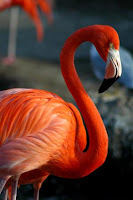 Everyone wants to live a long and healthy life. Evolutionarily, the longer you live, the more time you have to reproduce and pass on your genes to offspring.
Everyone wants to live a long and healthy life. Evolutionarily, the longer you live, the more time you have to reproduce and pass on your genes to offspring. Scientists at Cornell University have just completed a study looking at what makes some bird species more fit than others. Read the article "Big Plant-Eating Birds That Dwell With Others on Islands Live Longest" on sciencdaily.com then write a response.
Why do some birds living to only 10 years old, and others live 30 or more years? What traits allow the longest living birds to reach such an old age? How does natural selection and extrinsic factors affect the lifespan of these birds? How might this study relate to human lifespans?



Some birds live for only 10 years because they have a lot more predators then the birds that live for 30 or more years. They have predators that kill them before they are able to reproduce and pass on the trait of living longer. The birds that live for a very long time have some traits that help them live longer. They are, that their rates of extrinsic mortality are low, meaning that the birds in that population can all live longer and pass on that trait, as well as they can pass on the trait to their offspring. Another trait that the long living birds have is that they are sometimes much bigger than other birds therefore allowing them to not get eaten as much by predators. The study of the age of birds relates to the study of humans ageing because scientists can study avian aging factors and they can help underline what humans need to help increase our life spans.
ReplyDeleteCertain birds have a longer life span than others depending if the environment they live in is suitable for them. For example; if a bird that lives around various types of flowers but its beak shape is big which is made for cracking nuts, getting seeds, and eating insects, they would not survive as long because their beeks arn't long and narrow to eat flowers and vise versa for the same senario if a bird with a long narrow beak were to live in an area that provided bugs and fruit for them.
ReplyDeleteMany birds have a longer life span than others because of their environment. It seems like the bigger birds have an advantage because they have less predators. Birds that aren’t wild will live longer because they don’t run the risk of predators. I found it interesting that "breeding latitude, breeding habitat, nest-site location and migratory behavior do not have significant effects" on the life span of the birds. It seems like the nest-site location would have a major affect because the nest could be next to a variety of things.
ReplyDeleteScientists have found that the reasons some birds such as, flamingos, parrots, and petrels, live to be so old relates to their body mass, diet, sociality, and their environment. An example shown that expresses the body mass statement is that larger birds have less predators and can adapt and pass along their genes without dying out before traits can be passed to their offspring. There is also the extrinsic mortality factor, where the bird dies off too young because of some sort of cause it cannot control,in which it cannot pass along those selective traits. These all relate to human lifespans because it shows our advantages, like high metabolism rates,to living longer.
ReplyDeleteSome birds can live up to only 10 years because of how many predators kill them. They get killed before they even have the chance to get to reproduce and make new babies. But some other birds, such as the flamingo and parrots can live up to almost 30 years according to their sometimes large size or other different traits. Larger birds have less predators because they are less likely to get eaten up by them. These can all relate to human lifespans because this can show our strengths, such as our immune system and metabolism, to live a longer life.
ReplyDeleteSome bird species live a more extensive life than others because of their body mass, sociality, diet, and depending where they decided to nest their offspring. The body mass is similar to the marine animals where the bigger fish is on top of the food pyramid, in most cases. So according to this, the bigger the avian the less predators it will have and the easier it is to pass on its genes to the next generation. Also, herbivorous birds have an easier time gathering food than other birds because they don't have to fight against their meal, which some times might lead to injury. Another important reason some birds live longer is because they stay together in groups and fend off predators, like one big family! If a bird decides to breed in an island, then they will have much fewer predators. This can correspond to humans because if we choose to eat healthier things, live healthy, and safe then our life spans can increase like these birds.
ReplyDeleteEnvironment plays a huge role in the lifespan of birds. The bigger birds have the advantage because they tend to have less predators than the smaller birds. Birds in captivity will generally live longer than wild birds because they dont have to worry about predators. I found it interesting that the nest-site a bird chooses does not have any significant effects. It seems that a bird's ability to find food, water, and other neccestities can be determined by the location of the nest.
ReplyDelete